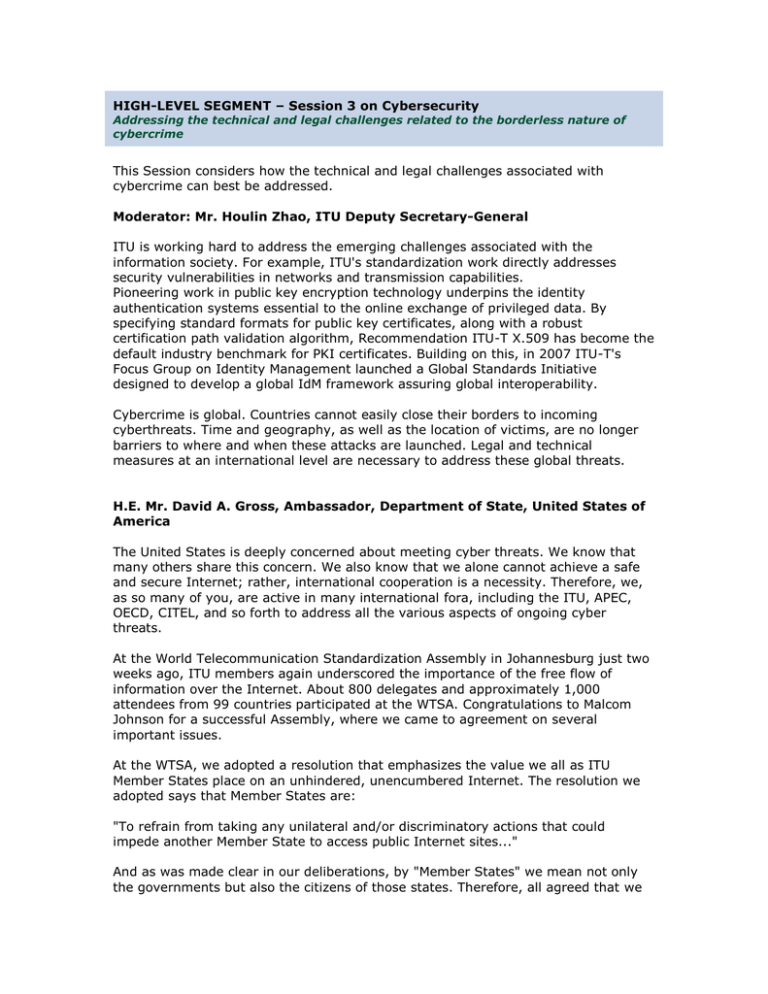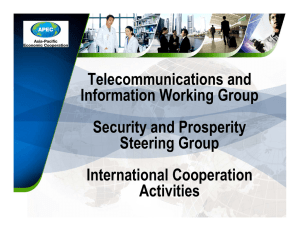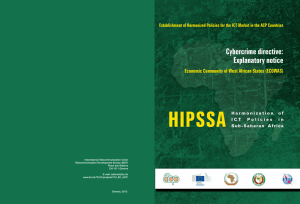HIGH-LEVEL SEGMENT – Session 3 on Cybersecurity
advertisement

HIGH-LEVEL SEGMENT – Session 3 on Cybersecurity Addressing the technical and legal challenges related to the borderless nature of cybercrime This Session considers how the technical and legal challenges associated with cybercrime can best be addressed. Moderator: Mr. Houlin Zhao, ITU Deputy Secretary-General ITU is working hard to address the emerging challenges associated with the information society. For example, ITU's standardization work directly addresses security vulnerabilities in networks and transmission capabilities. Pioneering work in public key encryption technology underpins the identity authentication systems essential to the online exchange of privileged data. By specifying standard formats for public key certificates, along with a robust certification path validation algorithm, Recommendation ITU-T X.509 has become the default industry benchmark for PKI certificates. Building on this, in 2007 ITU-T's Focus Group on Identity Management launched a Global Standards Initiative designed to develop a global IdM framework assuring global interoperability. Cybercrime is global. Countries cannot easily close their borders to incoming cyberthreats. Time and geography, as well as the location of victims, are no longer barriers to where and when these attacks are launched. Legal and technical measures at an international level are necessary to address these global threats. H.E. Mr. David A. Gross, Ambassador, Department of State, United States of America The United States is deeply concerned about meeting cyber threats. We know that many others share this concern. We also know that we alone cannot achieve a safe and secure Internet; rather, international cooperation is a necessity. Therefore, we, as so many of you, are active in many international fora, including the ITU, APEC, OECD, CITEL, and so forth to address all the various aspects of ongoing cyber threats. At the World Telecommunication Standardization Assembly in Johannesburg just two weeks ago, ITU members again underscored the importance of the free flow of information over the Internet. About 800 delegates and approximately 1,000 attendees from 99 countries participated at the WTSA. Congratulations to Malcom Johnson for a successful Assembly, where we came to agreement on several important issues. At the WTSA, we adopted a resolution that emphasizes the value we all as ITU Member States place on an unhindered, unencumbered Internet. The resolution we adopted says that Member States are: "To refrain from taking any unilateral and/or discriminatory actions that could impede another Member State to access public Internet sites..." And as was made clear in our deliberations, by "Member States" we mean not only the governments but also the citizens of those states. Therefore, all agreed that we are to refrain from impeding the access of any citizen of our countries to public Internet websites. It will continue to be a high priority for the United States, continuing into the next Administration, to find new, effective, and innovative ways to help all the people of the world have access to the Internet and to the information and opportunities it provides. H.E. Mr. Muhammad Nuh, Minister of Communication and Information Technology, Republic of Indonesia First, allow me broadly describe the Indonesia cyber space. Some statistics are given in the slide for the infrastructure and its utilization: PC density in Indonesia grows about 21% each year, while internet users increases by about 29% each year, and broadband internet users have proliferated at incredible speed of 215% due to the recent aggressive deployment of mobile broadband. Even though these percentages itself are not high, its absolute value is utterly significant due to the number of Indonesia population that is advancing slowly to a quarter billion. Considering the number of Indonesia cyber world inhabitants and its tremendous growth in the last three years, it is essential for Indonesia to adopt a progressive action toward securing its cyber space. As part of the global village, of course, we cannot cover all the initiatives exclusively in our own country. In the cyber space, no boundary exists; traffic will flow effortlessly almost without any restriction. In order to comprehensively respond to certain events, regional cooperation is an imperative. Government of Indonesia have proposed an efficacious regional and international cooperation by establishing a single point of contact for larger audiences, such as the ASEAN Single points of contact has been established. As already described above, the debate on Internet security cannot be separated from international relations. Meanwhile, each country undoubtedly retains its own interests and priorities. H.E. Mr. Samuel Lesuron Poghisio, MP, Minister of Information and Communications, Republic of Kenya At a higher level, we need to put in place legislation that will help address the cybersecurity issues from a legal point of view. In Kenya, arising from the realization that the existing legal framework is inadequate, the Government is developing a more comprehensive policy, legal and regulatory framework to among others, address issues of privacy, e-security, cybercrimes, ethical and moral conduct. It’s against this background that we have made the effort to develop ‘cyberlaws’. These are embedded in the Kenya Communications (amendment) Bill 2008, and the Electronics Transactions Bill, 2008 which is under discussion in the National Assembly. The thrust of the legislation being developed demonstrates recognition on our part that cybercrime is real. Laws should be able to go further to facilitate investigation and prosecution of persons engaged in cybercrime both at a local and international level. National laws cannot be effective in isolation. We are working with our counterparts in the East African region to develop cross-border legal framework. However, these efforts must go beyond national frameworks and strategies, and be expanded to continental and worldwide standards that can provide a platform for consolidated response. Ladies and gentlemen, handling critical communication networks also demands a high level of technical knowledge and continuous capacity building. We must also strive to overcome the limited human and institutional challenges. We need not emphasize that it is imperative for governments to join hands with private sector in order to make available, financial resources towards building the necessary capacity and competencies. Speedy reaction is of essence, because the criminals are also getting innovative by the day. Cybercrime has many forms, including financial fraud, identity theft, spam, malware attacks, and not forgetting exposure of children to risks through online child pornography. The list is endless. We cannot claim to have the capabilities to prevent, or respond to or recover from such incidents but, where there lies a will there is a way. Our consultations and continuous dialogue on possible solutions will bear fruit if we stay committed to the cause. Dr. Marianne Treschow, Director General, Swedish Post and Telecom Agency, Sweden The ITU GCA is a very positive step forward. It can provide us with a platform for response and I welcome this initiative. We also have a responsibility to protect our children. They are especially vulnerable to cyber criminals and therefore we have to do that together. Firstly, we need a stable, robust infrastructure, well protected against for example sabotage. Protecting important communication lines and nodes in the networks must be given priority. In Sweden we have placed the most important exchanges in underground bunkers. Creating redundancy and thus reducing vulnerability in the networks on a broader scale are of vital importance. Secondly, we need cooperation between stakeholders regarding logical attacks – cyber attacks. Many countries have computer emergency response teams (CERT), governmental or private. Cooperation between CERTS should be evolved further. In Sweden we have a government CERT with a staff of 15 people, prepared to go into 24/7 operation. Our CERT is involved in an extensive international cooperation with CERTs throughout the world. Finally, we need to train our abilities. On a national level, Sweden has had two big exercises focused on IT and telecommunications. The next one is planned for spring 2009. We need to find ways to exercise more on an international level, as I believe that practical exercise is the best way to pin-point vulnerabilities and show us where cooperation and communication fails in emergency situations. Sweden will have the EU presidency during the second half of 2009. The last time we were in that position we raised these questions to the EU level for the first time. One result of this is that the European Commission created the ENISA agency for coordinating, giving recommendations, promoting cooperation and raise awareness in the field of Internet security. I believe and hope that our upcoming EU presidency again will reflect our will to promote these issues.



